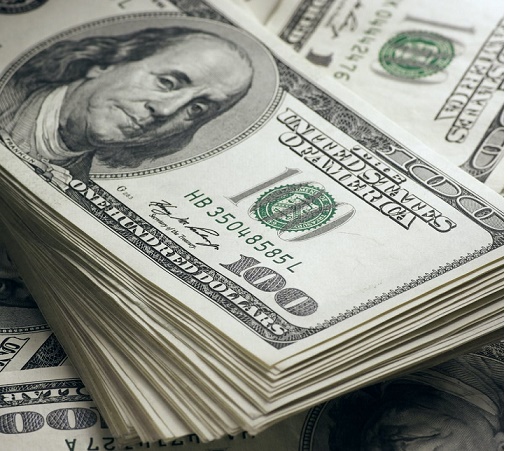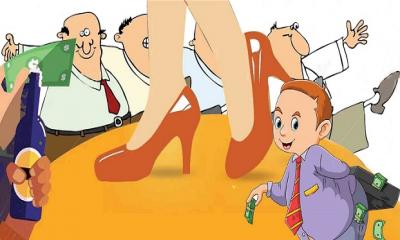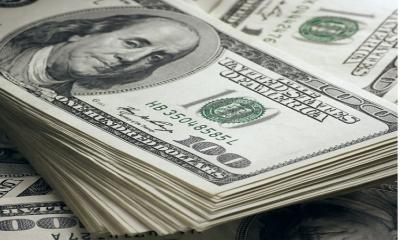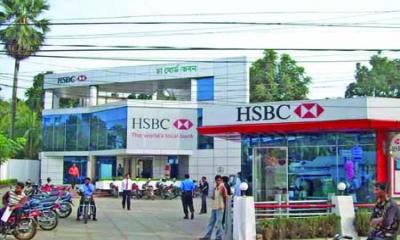# Inflation will rise: President, Shop Owners Association
# No good news for country: Executive President, BKMEA
Bangladesh Bank (BB) has introduced a new method of determining the rate of the dollar 'crawling peg'. As a consequence, the price of foreign currency US dollar has increased by Tk 7 in one jump in the country.
The central bank has raised the official price of the dollar from Tk 110 to Tk 117 due to less supply than demand in the market and the terms of the International Monetary Fund (IMF) loan.
The central bank issued a directive in this regard yesterday. According to the notification, from now on, dollars will be bought and sold in a new method called crawling peg.
Meanwhile, the price of the dollar was Tk 110 from September last year which was the dollar rate fixed by the Association of Bankers Bangladesh (ABB) and Bangladesh Foreign Exchange Dealers Association (BAFEDA).
However, traders said that being an import-dependent country, the cost of import will increase, the price of goods will increase as well. The pressure will increase on ordinary people. Inflation will further rise. It will have a negative impact on imports.
The crawling peg is a method of adjusting the exchange rate of foreign currency with the domestic currency. In this method, the exchange rate of a currency is allowed to fluctuate within a certain range. In this case, the maximum and minimum limits of the currency price are set. As a result, it cannot increase too much at once, nor can it decrease.
From now on, the intermediate rate has been fixed at Tk 117. Banks can add Tk 1 and subtract Tk 1. This means that the maximum bid of the dollar will be Tk 118. So far, the official price of selling the dollar was Tk 110. And the banks used to buy Tk 109.50.
The taka has been depreciating against the dollar since mid-2022. Besides, the country's inflation has also increased due to the increase in import costs. Now, business leaders believe that the sudden increase in the price of the dollar by Tk 7 will have a big impact on the import of goods. The increase in import costs will also increase inflation.
Md Helal Uddin, former vice-president of the Federation of Bangladesh Chambers of Commerce and Industry (FBCCI) and president of the Bangladesh Dokan Malik Samity, told The Daily Post, "We don't know where it ends now. We are import-dependent country. If the price of the dollar is not controlled, then people suffer and a crisis is created in the country. Bangladesh Bank should have a plan. It is necessary to tell how many days they will bring the price of the dollar to a certain place. They will increase the price of the dollar again and again and people will suffer, that is not the solution."
The business leader also said, "Tk 7 is not a less money. Imports will be severely affected. The cost of import of goods will increase a lot, which will force the importers to increase the price of the product."
Mohammad Hatem, executive president of Bangladesh Knitwear Manufacturers and Exporters Association (BKMEA), told The Daily Post, "It is good news for us that the price of the dollar has increased from Tk 110 to Tk 117. But this is not good news for the country. A rise in the value of the dollar will increase inflation and increase the pressure on the people. What's the point of raising the dollar? Because if I have to pay Tk 10 to 15 more to buy dollars, then there is no benefit in increasing the price of the dollar. Under no circumstances can there be more than Tk 1 difference between buying and selling."
He added that the cost of import will increase due to the increase in the price of the dollar. Now we have to pay more if I buy something. As a result, inflation will increase.
Meanwhile, BB has decided to increase the policy interest rate by 50 basis points to 8.5 percent to reduce high inflation. The new interest rate will be effective from today, the central bank said in a notification. The central bank is following a contractionary policy as inflation is above 9 percent.
In addition, the Standing Lending Facility (SLF) rate has been increased by 50 basis points to 10 percent. The Standing Deposit Facility (SDF) rate has been increased by 50 basis points to 7 percent.
However, industry stakeholders said that there will be no benefit by increasing the policy interest rate. Earlier, the central bank raised policy interest rates several times to reduce inflation. But inflation is not under control. In March, inflation was 9.81 percent.
According to sources, the overall inflation in the country was 9.74 percent in June 2023. Later in July, BB announced the first phase of the monetary policy for the fiscal year 2023-24. To control inflation, the central bank raised the policy rate on monetary policy by 50 basis points to 6.50 percent. And raising interest rates is the most widely used policy way for central banks to reduce inflation. The increase in the policy interest rate, also known as the repo rate, increases the cost of borrowing money from the central bank to commercial banks, which also increases the interest rate on loans. Rising interest rates raise the cost of borrowing for consumers, reducing credit demand and ultimately contributing to inflationary pressures.
Then in July 2023, the overall inflation stood at 9.69 percent. The next month, in August, the inflation jumped to 9.92 percent. At that time, the government was under pressure over the rise in commodity prices in the country. In the face of fourth-fold criticism, the central bank decided to raise policy interest rates again to control inflation. On September 29, 2023, the central bank raised the policy interest rate by 0.75 basis points to 7.25 percent.
Then in September last year, inflation came down slightly to 9.63 percent from August. But the next month, in October, inflation jumped to 9.93 percent.
Then on November 22 last year, the central bank decided to increase the policy interest rate again to control inflation. At that time, BB raised the policy rate by 50 basis points to 7.75 percent to reduce high inflation. Then on January 17 this year, the central bank increased the policy interest rate by 25 basis points to 8 percent in the monetary policy for the second half (January-June) of the financial year 2023-24. On May 8, the central bank raised the policy interest rate from 8 percent to 8.50 percent.
ZH






